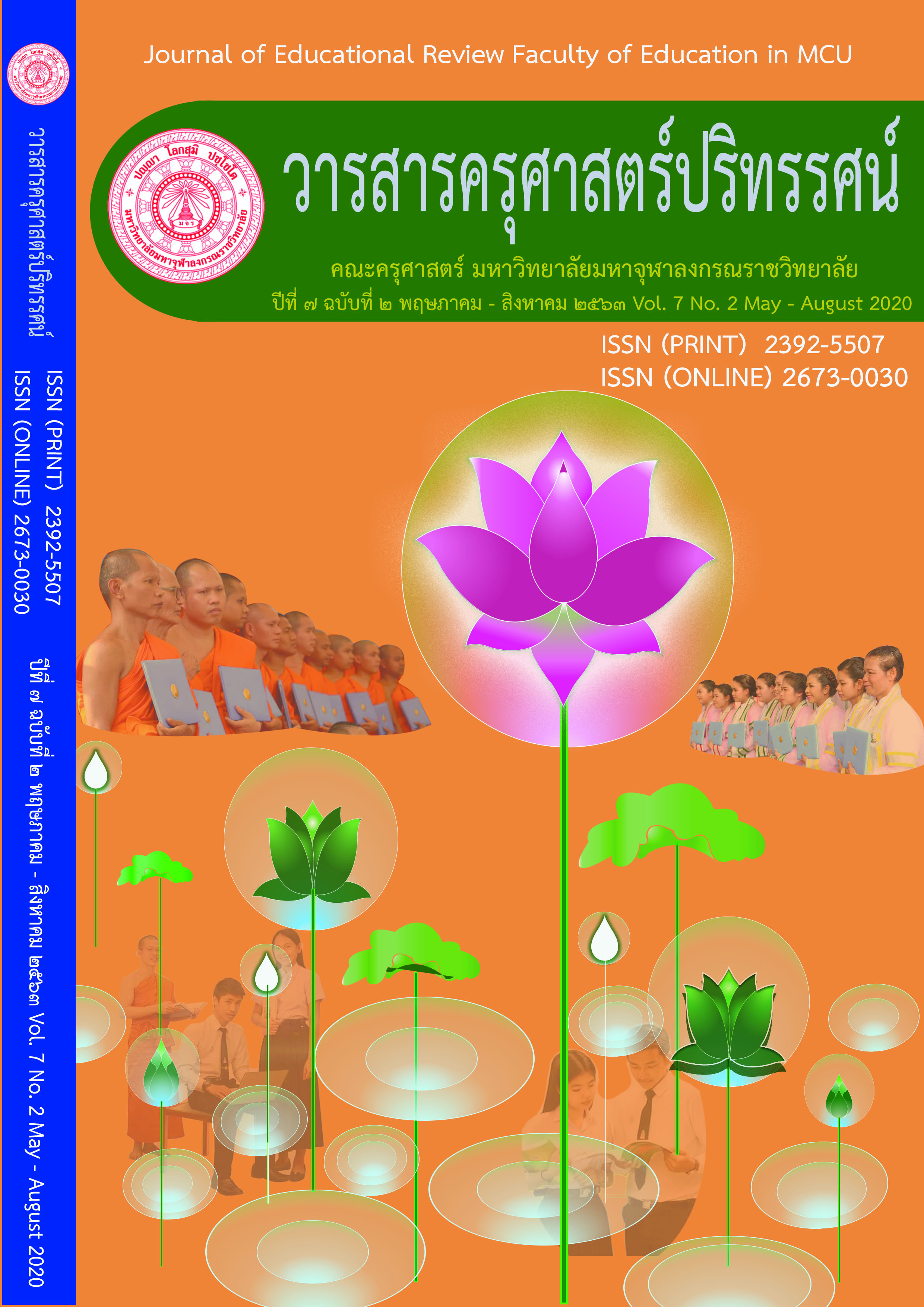THE PRIORITY NEEDS MORAL BEHAVIORS ACCORDING TO ETHICAL STANDARD ACT B.E. 2562 OF SCHOOL ADMINISTRATORS UNDER THE SECONDARY EDUCATIONAL SERVICE AREA OFFICE 2
Main Article Content
Abstract
The purposes of this research were to 1) study the current state, the expected state and the priority needs on moral behaviors according to the ethical standards act B.E. 2562 of the school administrators under the secondary educational service area office 2. 2) compare the current state and the expected state on moral behaviors according to the ethical standards act B.E. 2562 of the school administrators under the secondary educational service area office 2. This is quantitive research. A sample of 367 was drawn from teachers under the secondary educational service area office 2. The data were analyzed in terms of percentage, mean, standard deviation, t-test, ANOVA, Scheffe method comparision and modified priority needs index. The results revealed as follows. 1) The current states on moral behaviors according to the ethical standards act B.E. 2562 of school administrators were at the high to the very high level in all seven aspects. The expected states were at the very high level in all seven aspects. Those aspects were arranged in order of priorities are needed as the following: First, performing duties fairly without discrimination. Second, focusing on the achievement of work. Third, courage to make decision and do the right things. Fourth, focusing on public benefits rather than personal benefits and having public mind. Fifth, honestly, have a good conscience and be responsible for duty. Sixth, being a good role model and maintain the image of the government officer. Lastly seventh, having a strong commitment to the institutions of nation, religion and king including the democratic regime of government with the king as head of state. 2) The comparison between teachers ’opinions of the current state and the expected state on moral behaviors of school administrators classified by work experiences, educational background, found that those of all had no statistically significant difference but classified by school size had statistically significant difference at the .05 level.
Article Details
ทัศนะและความคิดเห็นที่ปรากฏในบทความในวารสารฉบับนี้ถือเป็นความรับผิดชอบของผู้เขียนบทความนั้นเพียงผู้เดียว และไม่ถือเป็นทัศนะและความรับผิดชอบของกองบรรณาธิการ
กองบรรณาธิการขอสงวนสิทธิ์ในการคัดเลือกบทความลงตีพิมพ์และจะแจ้งให้เจ้าของบทความทราบหลังจากผู้ประเมินบทความตรวจอ่านบทความแล้ว
ต้นฉบับที่ได้รับการตีพิมพ์ในวารสารครุศาสตร์ปริทรรศน์ คณะครุศาสตร์ มหาวิทยาลัยมหาจุฬาลงกรณราชวิทยาลัย ถือเป็นกรรมสิทธิ์ของคณะครุศาสตร์ มหาวิทยาลัยมหาจุฬาลงกรณราชวิทยาลัย ห้ามนำข้อความทั้งหมดหรือบางส่วนไปพิมพ์ซ้ำ เว้นเสียแต่ว่าจะได้รับอนุญาตจากมหาวิทยาลัยฯ เป็นลายลักษณ์อักษร
References
ชุติมา ศิริไพรวัน. (2561). คุณลักษณะที่พึงประสงค์ของผู้บริหารสถานศึกษาตามทัศนะของครู สังกัดสำนักงานเขตพื้นที่การศึกษาประถมศึกษา เขต 1. วิทยานิพนธ์ศึกษาศาสตรมหาบัณฑิต. มหาวิทยาลัยหาดใหญ่.
นิสัลมียะห์ อิสาเฮาะ. (2562). บทบาทของผู้บริหารในการพัฒนาโรงเรียนคุณธรรม ตามความคิดเห็นของครู สังกัดสำนักงานการศึกษาเอกชนในพื้นที่สามจังหวัดชายแดนใต้. การประชุมวิชาการเสนอผลงานวิจัยระดับบัณฑิตศึกษาแห่งชาติ ครั้งที่ 20. มหาวิทยาลัยขอนแก่น. 1928-1937.
บุษยมาศ แสงเงิน. (2553). ปัญหาที่พบในเรื่องของการพิจารณาความดีความชอบ. แหล่งที่มา https://www.gotoknow.org สืบค้นเมื่อ 17 ส.ค. 2562.
พระราชบัญญัติมาตรฐานทางจริยธรรม พ.ศ. 2562 (ฉบับที่ 1). (2562). ราชกิจจานุเบกษา เล่ม 136 ตอนที่ 50 ก หน้า 1 (16 เม.ย. 2562).
พระราชบัญญัติระเบียบข้าราชการครูและบุคลากรทางการศึกษา. (ฉบับที่ 4). (2562). ราชกิจจานุเบกษา เล่ม 136 ตอนที่ 43 ก หน้า 9 (5 เม.ย. 2562).
ศุภมาศ วิสัชนาม. (2560). คุณลักษณะที่พึงประสงค์ของผู้บริหารสถานศึกษา สังกัดสำนักงานเขตพื้นที่การศึกษาประถมศึกษาจันทบุรี. วิทยานิพนธ์ครุศาสตร์มหาบัณฑิต. มหาวิทยาลัยราชภัฎรำไพพรรณี.
สำนักงานเขตพื้นที่การศึกษามัธยมศึกษาเขต 2. (2562). รายงานผลการดำเนินงานประจำปีงบประมาณ พ.ศ. 2562. แหล่งที่มา https://www.secondary2.obec.go.th. สืบค้นเมื่อ 15 ก.ย. 2562.
สุริยพล ตนภู. (2560).คุณธรรมในการบริหารงานของผู้บริหารสถานศึกษา ตามเจตคติของครูผู้สอน กลุ่มโรงเรียนอำเภอสันติสุขตามหลักสังคหวัตถุ 4. วิทยานิพนธ์ศึกษาศาสตรมหาบันฑิต. มหาวิทยาลัยรามคำแหง.
Greenfield. (1991). Development International Education Programs. San Francisco: Josscy – Bass.
Krejcie Morgan. (1991). Determining Sample Size for Research Activities. From https:home. kku.ac.th.sompong.guest_speaker.KrejcieandMorgan_article.pdf Retrieved September 15.
Meier Bettina. (2004). Corruption in the Education Sector: An IntroductionTransparency International. From https://www.atositchallenge.net.wp-content.uploads.2016-11-Meier2004corruption-ineducation.pdf Retrieved September 15, 2019.


